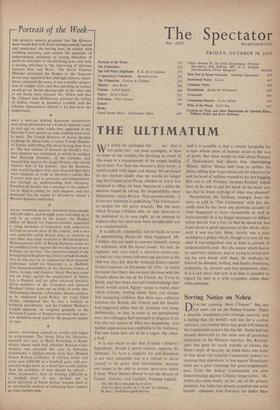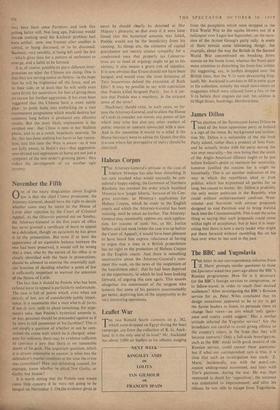Serving Notice on Nehru
DEVILISH cunning, these Chinese!' But not .just now; not on the Indian frontier. There a neurotic touchiness over strategic security, and a feeling that the world's well lost for a cordon sannaire, are costing them that good will towards the Communist powers the late Mr. Stalin had not already destroyed by the same sort of paranoiac behaviour on his Western marches. Mr. Khrush- chev has gone to much trouble to restore the West's sense of security. In Indid there was more of that good will towards Communist powers re- maining than elsewhere. A few square'Himalayan miles are a poor exchange for good-neighbourli- ness. Even the Indian Communists are now demonstrating against 'Chinese Imperialism.' Mr. Nehru has come badly, so far, out of the present situation, but India has already acquired one solid benefit : relations with Pakistan are better than hey have been since Partition, and look like getting better still. Not long ago, Pakistan would discuss nothing until the Kashmir problem had been settled : now, one frontier after another is settled, or being discussed, or to be discussed. tiiashmir, very sensibly, is being left until the last --which gives time for a pattern of settlement to emerge, and a habit to be formed.
It is, of course, possible to put a different inter- pretation 'on what the Chinese are doing. One is that they are serving notice on Nehru—in the hope that he will be frightened off the fence, and on to their side; or at least that he will settle even more firmly for neutralism, for fear of giving them an excuse for further aggression. It has even been suggested that the Chinese have a more subtle plan: to jostle India into embarking on a vast rearmament programme which would destroy her economy long before it produced any effective results. But the most likely explanation is the simplest one : that China is now in her Stalinist phase, and is, as a result, hopelessly neurotic. So far, this has done nothing but harm to her reputa- tion; and this time the West is aware—as it was not fully aware, in Stalin's day—that aggressive- ness abroad and oppression at home are not just a symptom of the new order's growing pains : they reflect the development of yet another ugly yranny.











































 Previous page
Previous page